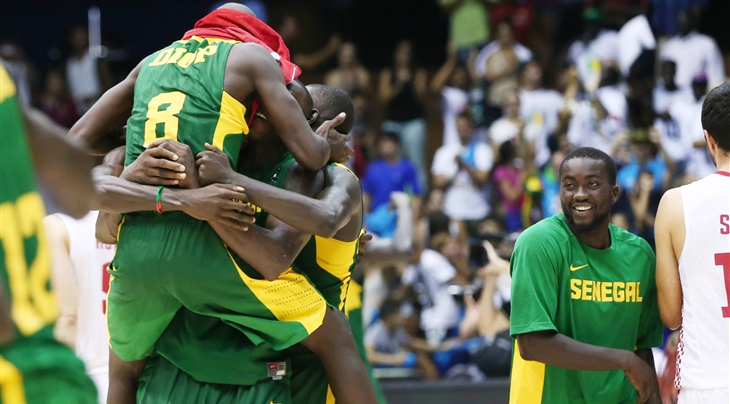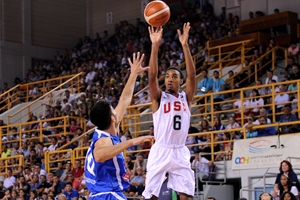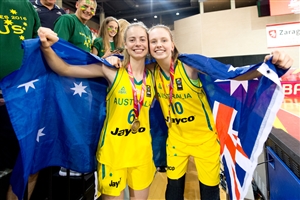
Can Angola, Senegal and Tunisia reach the Rio Olympics?
SHEFFIELD (Julio Chitunda’s African Message) - As the 2016 FIBA Olympic Qualifying Tournaments (OQTs) are set for tip off on Monday 4 July, African representatives Angola, Senegal and Tunisia have their last chances of reaching the Rio Olympics.
But can they do it?
Well, I will be tuning in the www.livebasketball.tv to follow some of the OQTs actions, which I consider to be the biggest challenges of these three African nations on the world stage in recent years.
The Africans will be playing thousands of miles away from home with a reduced or no fans at all to cheer them up.
But perhaps the hardest obstacles for Angola, Senegal and Tunisia are the limited tickets for the Rio Olympics [only three] on offer for 18 teams, and the hosts nations will certainly do anything in their power to avoid letting their fans down.
Unlike past OQTs, which gathered 12 teams in a single location, the new format has 18 teams distributed in three cities (Belgrade, Turin and Manila), battling it out for the remaining three tickets for the Olympics.
As former Nigeria's head coach Ayodele Bakare once told me: “Mathematically, the chances of any one team getting one of the 3 tickets has dropped significantly.”

Senegal are chasing their first Olympics ticket since 1980
In Manila, where Senegal will try to secure a ticket to the Olympics for the first time since 1980, the Western Africans are far from being favourites in a six-team tournament which includes France, Canada, Turkey, hosts Philippines, and New Zealand.
Although playing without Gorgui Dieng might cause Porfirio Fisac’s team some troubles at both ends of the floor, the return of Maurice Ndour, Hamady Ndiaye and the selection of naturalised Clevin Hannah gives Senegal arguments to win at least a game in the Group Phase.

Tunisia last played in the Olympics four years ago in London
In Turin, Tunisia’s chances of advancing to the Final Phase are relatively slim considering that the North Africans will go up against Group B opponents Croatia and hosts Italy, two European juggernauts looking to return to the Olympics family.
10 reasons to follow the 2016 #FIBAOQT in Turin https://t.co/PgrDYX5qu3 #RoadToRio pic.twitter.com/Spv7aJNszJ
— FIBA (@FIBA) July 3, 2016
Wouldn’t it be incredible if an outsider like Tunisia could reach the Rio Game after making their Olympics debut four years ago in London?
It would, but this is probably asking too much for a team that will be competing without Salah Mejri, who has been experiencing knee discomfort.
10 reasons to follow the 2016 #FIBAOQT in Belgrade: https://t.co/dUn9OlgH1t#RoadToRio pic.twitter.com/cYb9uR8Cbk
— FIBA (@FIBA) July 3, 2016
Serbia are not just favourite to win the Belgrade OQT, but they are also a team with an Olympic pedigree.
And, as well as having a talented roster, they have probably some of the most passionate basketball fans on the planet, who are expected to sell out every game of their national team.

After five straight Olympics appearances (1992, 1996, 2000, 2004 and 2008), Angola need to play their best to reach Rio
If Angola are to keep their Rio Olympics dream alive for a while they will need to try beating Puerto Rico in Group A before going against Serbia on Wednesday 6 July.
But, over the years, basketball has proven that anything is possible as long as one competes throughout.

By finishing third in the 2012 OQT in Caracas, Nigeria became the first African team to qualify for the Olympics via the OQT
Remember Nigeria’s OQT success in Caracas 2012? Or the Cleveland Cavaliers coming back from a 3-1 down in the NBA Finals against the Golden State Warriors to win their first-ever title? These are examples of tenacity that underdogs like Angola, Senegal and Tunisia need to keep in mind once they take to the OQTs.
Julio Chitunda
FIBA
FIBA's columnists write on a wide range of topics relating to basketball that are of interest to them. The opinions they express are their own and in no way reflect those of FIBA.
FIBA takes no responsibility and gives no guarantees, warranties or representations, implied or otherwise, for the content or accuracy of the content and opinion expressed in the above article.

















